Report
Feb 18 2022
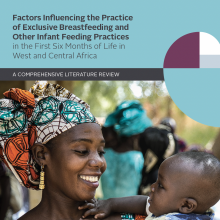
Factors Influencing the Practice of Exclusive Breastfeeding and Other Infant Feeding Practices in the First Six Months of Life in West and Central Africa
This comprehensive review of the literature written by Alive & Thrive and UNICEF provides nutrition stakeholders findings from research on the social and behavioral determinants of exclusive breastfeeding and other infant feeding practices during the first six months of life in West and Centr
Guide/Manual
Feb 09 2022
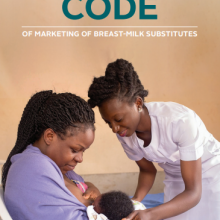
A Quick Guide: The International Code of Marketing for Breast-milk Substitutes
Updated February 2022!
This quick guide summarizes the International Code of Marketing of Breast-milk Substitutes (The Code) and relevant resolutions of the World Health Assembly that help protect breastfeeding around the globe.
Guide/Manual
May 11 2017
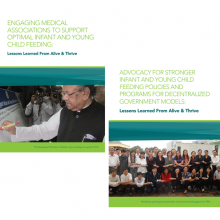
Best practices and lessons learned: Policy advocacy in three country contexts
From 2010-2014, Alive & Thrive worked in Bangladesh, Ethiopia, and Viet Nam to reduce undernutrition and death caused by sub-optimal infant and young child feeding (IYCF) practices.
Report
Feb 08 2016
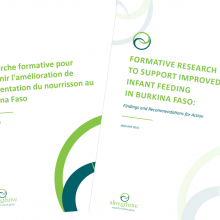
Formative Research to Support Improved Infant Feeding in Burkina Faso: Findings and Recommendations for Action
This report discusses the findings and recommendations from a study conducted to identify existing practices, barriers, and facilitating factors related to optimal infant and young child feeding in Burkina Faso.
Guide/Manual
Dec 28 2015
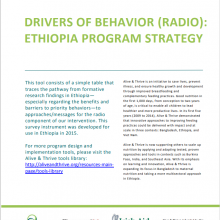
Drivers of behavior (radio): Ethiopia program strategy
This tool consists of a simple table that traces the pathway from formative research findings in Ethiopia— especially regarding the benefits and barriers to priority behaviors—to approaches/messages for the radio component of our intervention.
Guide/Manual
Oct 08 2015
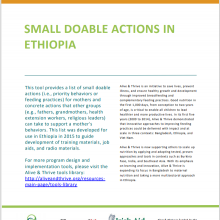
Small doable actions for IYCF in Ethiopia
Provides a list of small doable actions (i.e., priority behaviors or feeding practices) for mothers and concrete actions that other groups (e.g., fathers, grandmothers, health extension workers, religious leaders) can take to support a mother’s actions.

